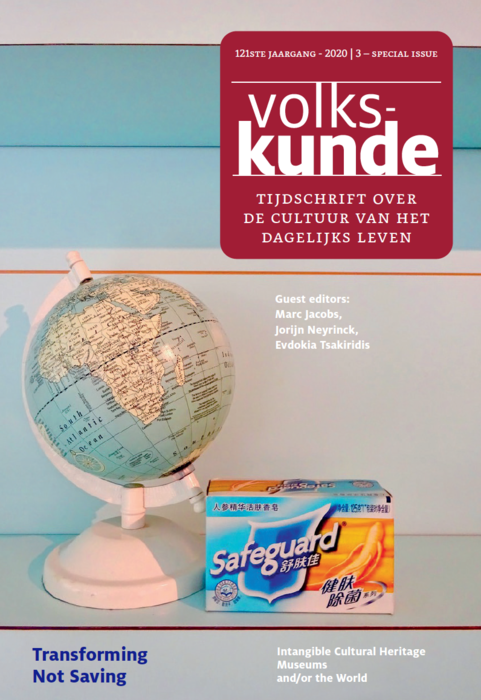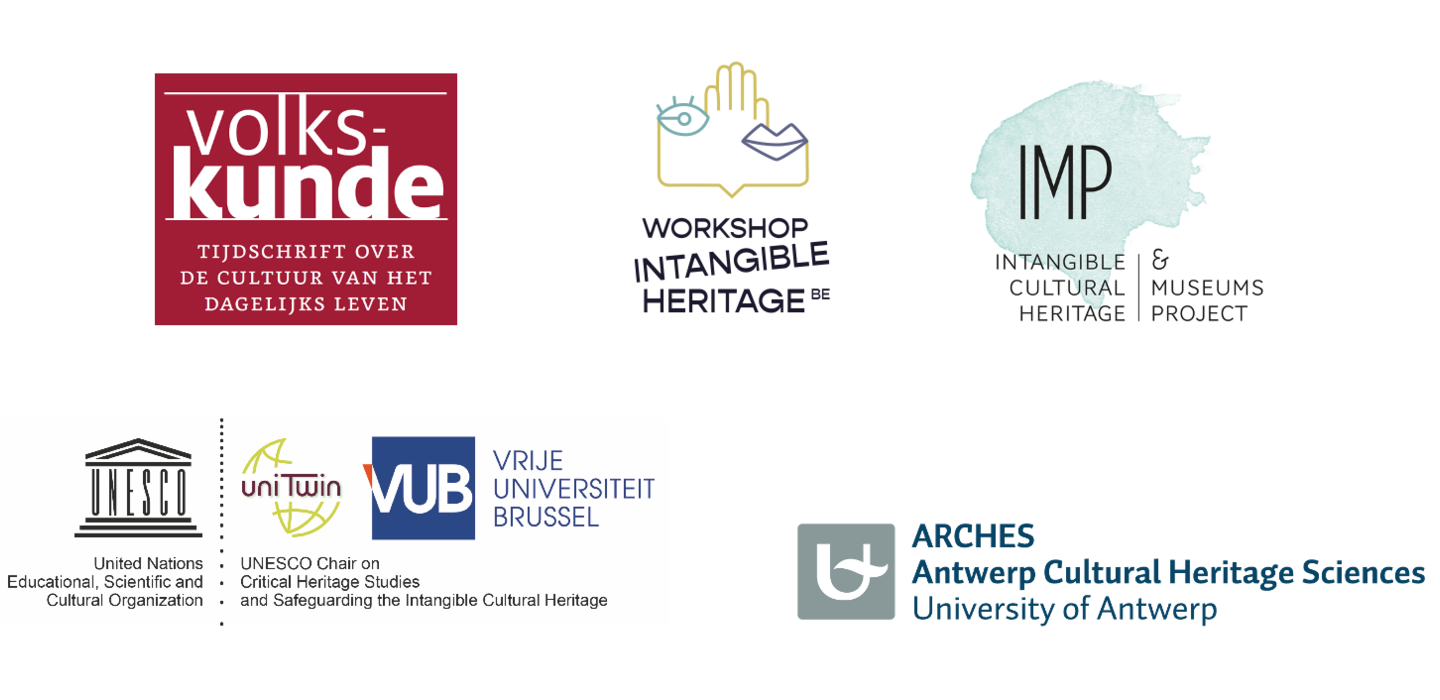Publicatie: Transforming, Not Saving. Intangible Cultural Heritage, Museums and/or the World.

[For English, see below.]
Werkplaats immaterieel erfgoed en de UNESCO Leerstoel voor kritische erfgoedstudies en het borgen van immaterieel cultureel erfgoed aan de Vrije Universiteit Brussel sloegen de handen in elkaar voor de gastredactie van een themanummer van het academische tijdschrift Volkskunde: ‘Transforming, Not Saving. Intangible Cultural Heritage, Museums and/or the World’ (2020). Deze wetenschappelijke publicatie levert een bijdrage aan de groeiende dynamiek en recente ontwikkelingen rond het borgen van immaterieel cultureel erfgoed en musea.
Het themanummer kwam tot stand in het kielzog van het internationale Intangible Cultural Heritage and Museums Project (IMP)[1], dat tussen 2017 en 2020 liep. IMP bracht museale en immaterieel-erfgoednetwerken transnationaal bijeen, en mobiliseerde onderzoekers verbonden aan universiteiten en andere erfgoedexperten.
Vanuit het IMP-project verscheen eerder het boek ‘Museums and intangible cultural heritage. Towards a third space in the heritage sector’ (2020), dat inzoomt op de vele snijvlakken tussen de werelden van musea en immaterieel erfgoed. Ook stelden de partners een online toolkit samen met praktische tips en instrumenten voor de sector. Aangezien de talrijke inzichten uit het IMP-project echter niet allemaal vervat zitten in de projectpublicaties, rijpte het idee voor een aanvullende uitgave: het Volkskunde-themanummer.
Voor dit themanummer kropen diverse betrokkenen uit het IMP-project opnieuw in hun pen. Ze brengen theoretisch-conceptuele reflecties, stukken die de relatie tussen immaterieel erfgoed(gemeenschappen) en musea kaderen, en (inter)nationale case-studies waarin het borgen van immaterieel erfgoed samen met musea en erfgoedgemeenschappen centraal staat.
Samen met het IMP-boek en de bijdrage van Werkplaats immaterieel erfgoed in het International Journal of Intangible Heritage Studies[2], plaatst dit themanummer het debat rond musea en het borgen van immaterieel cultureel erfgoed stevig op de agenda van museologie, antropologie, volkskunde, kritische erfgoedstudies en andere transdisciplines.
Het themanummer werd gelanceerd naar aanleiding van de vijfde tweejaarlijkse conferentie van de Association of Critical Heritage Studies (ACHS) in augustus 2020.
Of download één van de afzonderlijke bijdragen:
- Marc Jacobs, Jorijn Neyrinck and Evdokia Tsakiridis, Safeguarding Intangible Cultural Heritage and Museums. A Crossing of Several Projects and Trajectories
- Jorijn Neyrinck, Evdokia Tsakiridis en Marc Jacobs, Het borgen van immaterieel cultureel erfgoed en musea. Een kruispunt van verschillende projecten en trajecten
- Evdokia Tsakiridis, Marc Jacobs and Jorijn Neyrinck, Safeguarding Intangible Cultural Heritage and Museums. A Special Issue
- Marc Jacobs, Words Matter... The Arsenal and the Repertoire: UNESCO, ICOM and European Frameworks
- Cécile Duvelle, Le patrimoine culturel immatériel a-t-il une place au musée?
- Amereswar Galla, Discursive Crossings in Liminal Spaces
- Janet Blake, Participation in Safeguarding Intangible Cultural Heritage Viewed as a Human Rights Imperative
- Marc Jacobs, On Levels, (Politics of) Scale, Cases and Networking
- Hanna Schreiber, Squaring the Circle? In Search of the Characteristics of the Relationship between Intangible Cultural Heritage, Museums, Europe and the EU
- Filomena Sousa, Is ‘Bottom-Up’ a Condescending Expression? Tales of Indignation and Reflexivity
- Marc Jacobs, Pourquoi? Why Museology and Museums Should – more than ever – be Part of the Heritage Paradigm...
- Florence Pizzorni Itié, Le PCI et les musées. Quand l’esprit vient à la matière sous l’arbre à palabres
- Tamara Nikolić –Derić, Intersections. Bridging the Tangible and Intangible Cultural Heritage Practices
- Sarah Kenderdine, Reenactment and Intangible Heritage. Strategies for Embodiment and Transmission in Museums
- Sophie Elpers, Past and Future Presencing in Museums. Four Cases of Engaging with Intangible Heritage from the Netherlands
- Sergio Servellón and Leen Van de Weghe, Avant-Garde & Status Quo. The FeliXart Museum and its Paradoxical Legacy
- Valentina Lapiccirella Zingari, Pietro Clemente and Tommaso Lussu, Alessandra Broccolini and Claudio Gnessi, In Rural Villages and the Suburbs. Italian Experiences with Museums and Ecomuseums
- Andrzej Iwo Szoka, Szopka Krakowska. The Nativity Scene Tradition and the Museum of Kraków
- Marc Jacobs and Jorijn Neyrinck, Transforming, Not Saving. Intangible Cultural Heritage, Museums and/or the World
- IMP was een initiatief van Werkplaats immaterieel erfgoed – lead partner (BE), Kenniscentrum Immaterieel Erfgoed Nederland, SIMBDEA (IT), Verband der Museen der Schweiz (CH) in Zwitserland, CFPCI (FR). Geassocieerde partners van dit Europese samenwerkingsproject rond het borgen van immaterieel erfgoed in/met musea, waren o.m. ICOM International, NEMO en het ICH NGO Forum.
- J. Neyrinck, E. Seghers en E. Tsakiridis, ‘At the interface between living heritage and museum practice: dialogical encounters and the making of a “third space” in safeguarding heritage’, International Journal of Intangible Heritage 15, 2020, p. 61-85.

The special issue came about in the wake of the international Intangible Cultural Heritage and Museums Project (IMP)[1], that ran from 2017 to 2020. IMP gathered museum and intangible heritage networks transnationally, and mobilised researchers linked to universities and other heritage experts.
Earlier in 2020, the actors from the IMP project published the book ‘Museums and intangible cultural heritage. Towards a third space in the heritage sector’, which focuses on the many interfaces between the world of museums and that of intangible heritage. In addition, the project partners compiled an online toolkit, containing practical tips and instruments for the heritage sector. However, given the multitude of valuable insights generated by the IMP project not yet published, the idea arose for an additional publication: the Volkskunde special issue.
Several researchers and experts involved in the project picked up their pen again. They bring theoretical-conceptual reflections, pieces that frame the relationship between intangible heritage (communities) and museums, and (inter)national case-studies focusing on safeguarding intangible heritage together with museums and heritage communities.
Along with the IMP book and Workshop intangible heritage’s contribution to the International Journal of Intangible Heritage Studies[2], this special issue places the debate on museums and safeguarding intangible cultural heritage high on the agenda of museology, anthropology, folklore studies, critical heritage studies and other transdisciplines.
The special issue was launched on the occasion of the fifth biennial conference of the Association of Critical Heritage Studies (ACHS) in August 2020.
[English]
Workshop intangible heritage and the UNESCO Chair on critical heritage studies and safeguarding the intangible cultural heritage of the Vrije Universiteit Brussel guest-edited a special issue of the academic journal Volkskunde: ‘Transforming, Not Saving. Intangible Cultural Heritage, Museums and/or the World’ (2020). This scholarly product contributes to the growing dynamics and recent developments around safeguarding intangible cultural heritage together with museums.
The special issue came about in the wake of the international Intangible Cultural Heritage and Museums Project (IMP)[1], that ran from 2017 to 2020. IMP gathered museum and intangible heritage networks transnationally, and mobilised researchers linked to universities and other heritage experts.
Earlier in 2020, the actors from the IMP project published the book ‘Museums and intangible cultural heritage. Towards a third space in the heritage sector’, which focuses on the many interfaces between the world of museums and that of intangible heritage. In addition, the project partners compiled an online toolkit, containing practical tips and instruments for the heritage sector. However, given the multitude of valuable insights generated by the IMP project not yet published, the idea arose for an additional publication: the Volkskunde special issue.
Several researchers and experts involved in the project picked up their pen again. They bring theoretical-conceptual reflections, pieces that frame the relationship between intangible heritage (communities) and museums, and (inter)national case-studies focusing on safeguarding intangible heritage together with museums and heritage communities.
Along with the IMP book and Workshop intangible heritage’s contribution to the International Journal of Intangible Heritage Studies[2], this special issue places the debate on museums and safeguarding intangible cultural heritage high on the agenda of museology, anthropology, folklore studies, critical heritage studies and other transdisciplines.
The special issue was launched on the occasion of the fifth biennial conference of the Association of Critical Heritage Studies (ACHS) in August 2020.
Or download the articles separately below:
- Marc Jacobs, Jorijn Neyrinck and Evdokia Tsakiridis, Safeguarding Intangible Cultural Heritage and Museums. A Crossing of Several Projects and Trajectories
- Jorijn Neyrinck, Evdokia Tsakiridis en Marc Jacobs, Het borgen van immaterieel cultureel erfgoed en musea. Een kruispunt van verschillende projecten en trajecten
- Evdokia Tsakiridis, Marc Jacobs and Jorijn Neyrinck, Safeguarding Intangible Cultural Heritage and Museums. A Special Issue
- Marc Jacobs, Words Matter... The Arsenal and the Repertoire: UNESCO, ICOM and European Frameworks
- Cécile Duvelle, Le patrimoine culturel immatériel a-t-il une place au musée?
- Amereswar Galla, Discursive Crossings in Liminal Spaces
- Janet Blake, Participation in Safeguarding Intangible Cultural Heritage Viewed as a Human Rights Imperative
- Marc Jacobs, On Levels, (Politics of) Scale, Cases and Networking
- Hanna Schreiber, Squaring the Circle? In Search of the Characteristics of the Relationship between Intangible Cultural Heritage, Museums, Europe and the EU
- Filomena Sousa, Is ‘Bottom-Up’ a Condescending Expression? Tales of Indignation and Reflexivity
- Marc Jacobs, Pourquoi? Why Museology and Museums Should – more than ever – be Part of the Heritage Paradigm...
- Florence Pizzorni Itié, Le PCI et les musées. Quand l’esprit vient à la matière sous l’arbre à palabres
- Tamara Nikolić –Derić, Intersections. Bridging the Tangible and Intangible Cultural Heritage Practices
- Sarah Kenderdine, Reenactment and Intangible Heritage. Strategies for Embodiment and Transmission in Museums
- Sophie Elpers, Past and Future Presencing in Museums. Four Cases of Engaging with Intangible Heritage from the Netherlands
- Sergio Servellón and Leen Van de Weghe, Avant-Garde & Status Quo. The FeliXart Museum and its Paradoxical Legacy
- Valentina Lapiccirella Zingari, Pietro Clemente and Tommaso Lussu, Alessandra Broccolini and Claudio Gnessi, In Rural Villages and the Suburbs. Italian Experiences with Museums and Ecomuseums
- Andrzej Iwo Szoka, Szopka Krakowska. The Nativity Scene Tradition and the Museum of Kraków
- Marc Jacobs and Jorijn Neyrinck, Transforming, Not Saving. Intangible Cultural Heritage, Museums and/or the World
- IMP was an initiative of Workshop intangible heritage – lead partner (BE), Kenniscentrum Immaterieel Erfgoed Nederland (NL), SIMBDEA (IT), Verband der Museen der Schweiz (CH) and CFPCI (FR). Associated partners included ICOM International, NEMO and the ICH NGO Forum.
- J. Neyrinck, E. Seghers en E. Tsakiridis, ‘At the interface between living heritage and museum practice: dialogical encounters and the making of a “third space” in safeguarding heritage’, International Journal of Intangible Heritage 15, 2020, p. 61-85.
